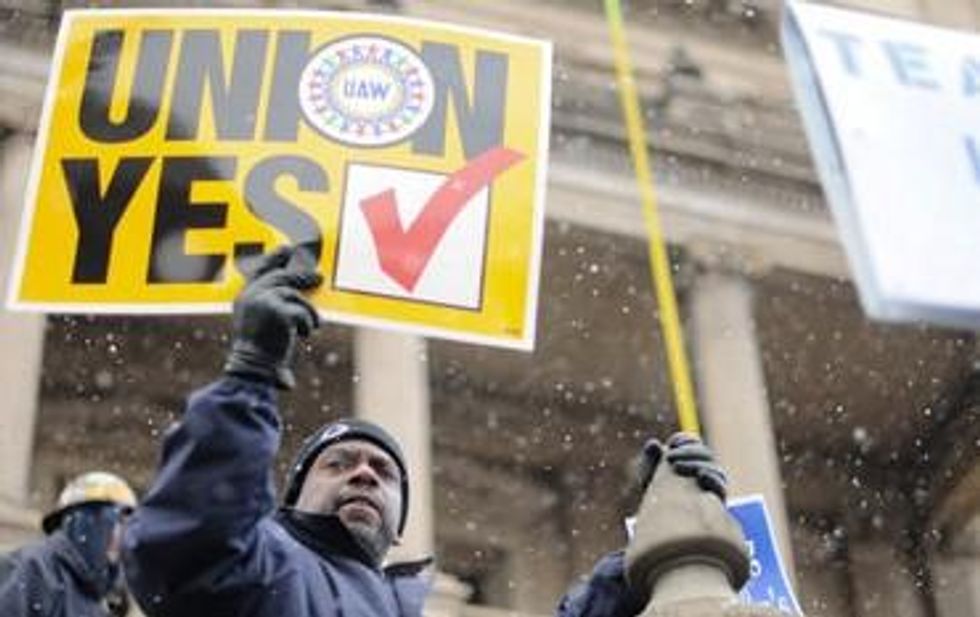By now, most people realize that private sector union membership in the U.S. stands at about 7-percent, which means that 93-percent of all private sector jobs are non-union. Which makes those accusations of unions of being "too big" and "too powerful" even more ridiculous and hysterical than they were when private sector membership was only a meager 10-percent.
Yet, even with these depressingly low membership numbers, if America's non-union workers rooted for unions to succeed, and, indeed, aspired to join a union themselves, it would mean, at least in theory, that the labor movement was alive and well and had a decent chance of succeeding.
Unfortunately, that doesn't seem to be the case. Alas, too many non-union workers not only don't admire or respect labor unions, they hate them. They fear them. They resent them. It's as if America's corporate masters had gathered all the underpaid, under-benefited non-union workers together in the same room, and done some hideous Manchurian Candidate brain-washing number on them, convincing them that they could trust the profit-motive more than they could trust a workers collective.
As a college student, I worked part-time as a breakfast cook. I'm not exaggerating when I say that, back in those days, it was the dream of every cook to get a job in a union manufacturing plant. That was their life's goal. These guys didn't dream of being millionaires or lottery winners or entrepreneurs; they dreamed of working in an industrial setting where the wages, benefits, and working conditions were union-scale.
Which is why it's so disappointing to see the antipathy directed toward unions today. One objection is that unions are "corrupt." That assertion has always puzzled me. Are people confusing ineptitude, laziness, and lack of imagination with "corruption," because I've never seen any evidence of widespread corruption, certainly not enough to damage labor's reputation. Are these people locked into some sort of time-warp, where they still imagine seeing newsreel footage of union honchos doing the perp-walk? Those days are over.
Another objection is that workers shouldn't be forced to join a union or forced to pay dues. That one not only puzzles me, it irritates me. You hire into a union shop because the wages and benefits are roughly 15-percent better than non-union facilities, and yet you balk at having to embrace the very organization that made those wages and benefits possible? Several words come to mind: hypocrite, freeloader, ingrate.
In an odd way, the resentment at being "forced" to join a union (despite its obvious advantages) reminds me of the South's resistance to desegregation. Southerners wouldn't accept the fact that the federal government could tell a restaurant owner in Alabama that he no longer had the right to choose whom he could and couldn't serve. Even though the restaurant was private property, his "Whites Only" signs had to come down. It was a concept people couldn't absorb. Perhaps that same mind-set applies to union membership.
This classic labor vs. management adversarial relationship has been in place in the U.S. ever since the mid-19th century, and has existed in Europe for even longer. Because everything and everyone--the Congress, the media, the police, the banks, the Church, the city fathers--were arrayed against the unions, it was a constant struggle, and any progress labor made came at a steep price.
But the one enduring resource unions could always count on--the one built-in advantage they had--was the support of working men and women. And that was because workers felt they were all pretty much in the same boat. Moreover, it was this grassroots, across-the-board solidarity that management most feared because they had no way of combating it, other than by giving workers a larger slice of the pie.
And this is what makes the current anti-unionism so disturbing. Despite statistics clearly showing that the middle-class is losing more ground every year, the average worker, for whatever reason, continues to place more faith in the generosity and infallibility of the so-called "free market" than he does in the only lobbying organization working people have ever had. It's like one of those old cowboy movies, but one where the Indians trust the cavalry more than their own tribe.
If the support of decent, hard-working men and women continues to evaporate, it means we're sunk. Simple as that. It means Corporationism has not only won the battle, but the war. And who knows? Maybe this thing is already over. Maybe organized labor is walking around zombie-like, unaware that it's America's Undead.

